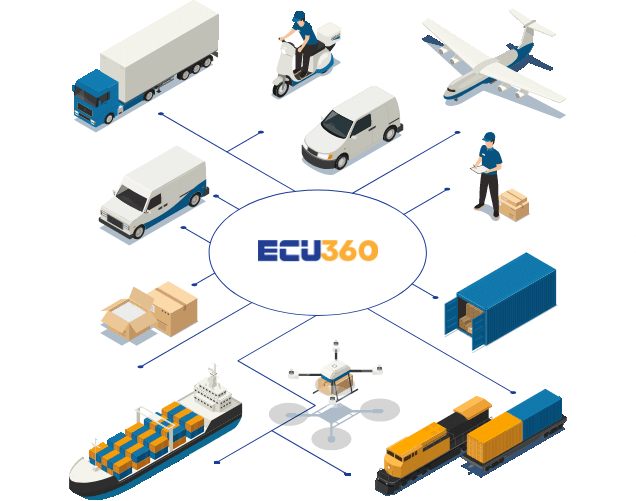LTL Vs. FTL in ground shipping – Understand basic difference
Whether you’re a newcomer to inland freight or a seasoned shipper, you’ve probably come here looking for some help deciphering the notoriously complicated industry jargon. This, combined with the numerous decisions to be made when shipping goods, will almost certainly have you in a rage.
Knowing the ins and outs of the shipping industry will undoubtedly help your company’s long-term health. To help you, we’ve created our own LTL quotation calculator, but before you use it, let’s get you up to speed on two specific modes of transportation that can sometimes lead to confusion when deciding which to use: LTL or FTL?
LTL and FTL
LTL is an abbreviation for less-than-truckload. LTL refers to the transportation of multiple shippers’ freight on the same trailer as opposed to a single company’s freight on an individual trailer. Several LTL shipments are combined into a single truck to fill it as full as possible. This is a great option for shipments of one to six pallets or any shipment of less than 14 linear feet because it maximizes the available shipping space on a given truck. This is advantageous for small businesses’ shipping requirements.
Full truckload freight is referred to as FTL. FTL shipping is commonly used for large shipments that necessitate filling the entire truck, or nearly so. With FTL, your freight is the only freight moving on a single truck, giving you exclusive access to the entire truck and theoretically filling the truckload. Even if you don’t need to fill the entire available space, you can reserve the truck with its full capacity. This way, you won’t have to worry about your goods changing hands or being stuck with other products at any time.
Differences the distinction between LTL and FTL
The primary distinction between LTL and FTL is that LTL offers greater cost savings when shipping only a few pallets at a time. This is less expensive for you because you are only paying for the space you use, rather than paying for a full truck that isn’t fully loaded. LTL carriers must maintain efficiency by filling empty space with other shipments to get as close to maximizing available space on their trucks as possible.
There is a significant difference between LTL and FTL carrier transit times. If you have a full truckload, your carrier will pick up your shipment and drive it directly to the receiver, making transit very predictable. However, because of all the stops they must make, LTL transit does not go directly to the end customer, so the actual delivery date may differ significantly from the estimated delivery date.
Because they are only picking up one shipment, FTL carriers will schedule a specific delivery time. Because trucking companies handling LTL shipments must pick up and deliver at multiple locations, their pick-up times will fall within a broader window, necessitating more flexibility on your part.
Another distinction is that a full truckload shipper will load your product at the point of origin, seal the trailer, and deliver it directly to its destination. Your product will typically be loaded and unloaded in and out of trailers and warehouses several times before reaching its final destination with an LTL shipment. This means that your products will be subjected to more handling and exposure, which increases the likelihood of damage, especially if they are sensitive or fragile.
How to Choose Between LTL and FTL?
There are times when LTL or FTL should be used. There are no hard and fast rules to follow; however, there are some situations where full truckload freight may be preferable to LTL.
If you need to ship more than six pallets at once, the full truckload option is the best choice. If your product is fragile and you want to avoid excessive loading and unloading by multiple carriers, the full truckload option is the best option for you because you know that your fragile products are the only items in that truck.
If you require guaranteed delivery and pick-up dates, the full truckload option is preferable because you can reserve a single carrier to transport your items. You must use the full truckload option for time-sensitive deliveries.
If you have a smaller shipment that is less than six pallets, you will save more money by using the LTL method. If you have some flexibility in terms of delivery or shipping date, the LTL option will be much better suited for you. You can benefit from the savings of combining your shipment with another shipment by giving you a pickup and delivery range at either end, rather than requiring a more specific time schedule.
It is critical to understand the likelihood of your products being damaged during shipment. You should ensure that they are strong enough to withstand regular handling at various points throughout the shipping process, or that they have been properly packaged so that regular handling is unlikely to cause damage.
Working with a 3PL for LTL and FTL Shipments
As you have seen, understanding and deciding which of these two freight options is best for your company can be a difficult task. As a result, when it comes to shipping LTL or FTL freight, partnering with a third-party logistics provider (3PL) is often the best option, especially when shipments have special requirements or time sensitive deadlines. 3PL companies offer an advantage to businesses looking for the most competitive rates in the market as well as dependable service. Here are some of the advantages of using a 3PL to handle your freight shipments.
Expertise
Many 3PL providers, both LTL and FTL, have freight shipping as a core competency. They have the experience to determine the best way to handle your freight because they do it every day. A 3PL assists numerous clients with freight shipping and has visibility into various products, issues, and other factors that determine the best option for your company. This knowledge allows them to evaluate your shipping and select the most efficient option while anticipating potential risks or higher costs.
Savings on expenses
Your company may only ship a few pallets to a smaller area each month, whereas a 3PL ships a significantly higher volume across the entire country or internationally on a daily basis. Their volume and purchasing power give 3PLs negotiating power with freight carriers. You can obtain these low-cost rates by collaborating with a 3PL.
Visibility
Any business must be aware of what is happening with their freight at all times. Many businesses are concerned about losing control when using a 3PL for LTL or FTL. In reality, you gain more visibility into the location of your shipment than you would have had if you tried to manage the process yourself. A professional team will focus on providing the highest level of service to your company, including detailed updates from the time your shipment is initiated until it reaches its destination.
In conclusion
The final decision between FTL and LTL shipping will be based on your freight shipment’s costs, timing, and handling requirements. In many cases, LTL is the less expensive option for smaller loads, but if your load is heavy for its size, irregular in shape, or takes up more than half of a truckload, it’s a good idea to get quotes for both options. Even if your load leaves empty space on the truck, full truckload is sometimes the best option.
You can now rest easy with ECU360 Trucking Solutions which takes care of your truck transport needs including stevedoring. So, if you are looking for complete D2D solution, ECU360 is your single window contact for it.
Frequently Asked Questions –
1. Is LTL better than FTL?
There is less risk of breakage or damage with FTL because goods remain on one truck for the entire journey (without being transferred during transport). If, on the other hand, your shipment is long-lasting, LTL may be the most cost-effective option.
2. What is LCL and LTL?
Across 52 countries, we can provide LTL (Less Than Truckload), FTL (Full Truckload), LCL (Less Than Container Load), and FCL (Full Container Load) shipping. LTL (Less Than Truckload) – A shipment that does not necessitate the use of a full 48′ or 53′ trailer.
Like





Comments